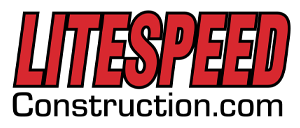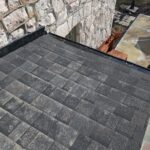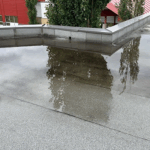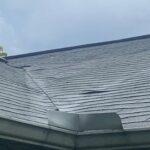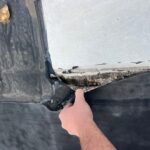Out-of-Pocket Costs for Roof Repairs After Insurance
When it comes to roof repairs, understanding the costs you’ll face out-of-pocket after insurance can be crucial for homeowners, especially in areas like Asheville, NC, where varied weather conditions can impact roof longevity.
While insurance is meant to cushion large expenses, there are several factors that influence the total costs for roof repairs that homeowners may have to cover.
In this article, we’ll explore everything Asheville homeowners need to know about insurance coverage for roof repairs, out-of-pocket expenses, and ways to minimize costs.

Roof Repair Insurance Coverage
Most homeowner insurance policies cover roof damage if it’s caused by a “covered peril,” which typically includes storms, wind, and hail. However, standard policies may not cover damage from wear and tear, neglect, or gradual deterioration. In Asheville, a region prone to heavy rains and seasonal storms, many homeowners may rely on insurance to handle repair costs, especially after severe weather events.
Factors Affecting Insurance Coverage for Roof Repairs
Insurance coverage for roof repairs varies widely, with factors such as:
Policy Type: Basic policies may cover fewer perils, while more comprehensive plans cover a broader range.
Roof Age: Policies may cover the actual cash value (ACV) rather than replacement cost if the roof is older.
Deductibles: Homeowners must pay a deductible before insurance kicks in, affecting the out-of-pocket cost.
Type of Damage: Only specific types of damage are covered by insurance, often leaving maintenance-related issues as out-of-pocket expenses.
Understanding these factors can help Asheville homeowners estimate their out-of-pocket costs more accurately.
Calculating Out-of-Pocket Costs for Roof Repairs
Your out-of-pocket costs will depend on several variables, including your insurance coverage limits, deductible, and the extent of roof damage. Here’s a breakdown of factors to consider.
1. Deductible Requirements
The deductible is the amount a policyholder pays before insurance benefits apply. According to recent data, homeowners in North Carolina generally have deductibles ranging from $500 to $2,500, depending on their specific policy and coverage level. Higher deductibles can mean lower premiums but also larger out-of-pocket costs for roof repairs.
2. Repair Type and Materials
The specific materials required for repairs will significantly affect the overall costs. For instance, asphalt shingles, a common roofing material in Asheville, are less expensive than slate or metal roofing. Here’s a breakdown of average roof repair costs by material:
| Roofing Material | Average Cost Per sq. ft. | Expected Repair Cost for 500 sq. ft. |
|---|---|---|
| Asphalt Shingles | $3 - $5 | $1,500 - $2,500 |
| Metal Roof | $5 - $12 | $2,500 - $6,000 |
| Slate Roof | $15 - $25 | $7,500 - $12,500 |
These costs illustrate how the materials used can influence the total repair costs. Your insurance policy may only cover a percentage of these costs, especially if replacement materials are of higher quality than the existing roof.
3. Extent of Roof Damage
The severity of the damage can also determine how much homeowners need to pay out-of-pocket. Partial repairs (like fixing a few shingles) will obviously cost less than a complete roof replacement. In Asheville, where weather-related damage is a common concern, minor repairs after a storm might cost between $200 to $1,000, while a full replacement could exceed $8,000.
Roof Repair Costs & Insurance Coverage
Average Roof Repair Costs in North Carolina: Homeowners in NC spend between $1,000 and $5,000 on average for roof repairs, depending on the scope and materials used. This is above the national average due to specific weather patterns in the region.
Claims Approval Rates: Approximately 70% of roof-related claims are approved by insurers, but not all are fully covered. Homeowners may still need to cover 20-30% of the repair costs out-of-pocket.
Impact of Roof Age: Homes with roofs over 20 years old are often only partially covered, as insurers may apply depreciation when calculating the claim amount.
Minimizing Out-of-Pocket Costs
Regular Inspections: Routine inspections can detect minor issues before they escalate. Many roofing companies in Asheville offer seasonal inspections to help homeowners document roof condition, which can be useful for future claims.
Choose Contractors with Insurance Expertise: Working with a roofing company experienced in handling insurance claims can ensure more accurate estimates and smoother claims processes.
Negotiate Repair Options: If your policy covers only a portion of the repair cost, talk to contractors about cost-effective repair methods or materials.
Consider Roofing Warranties: Many roofing materials come with warranties that can offset repair costs. Manufacturers of asphalt shingles, for instance, often provide warranties ranging from 10 to 25 years.
Pros and Cons of Relying on Insurance for Roof Repairs
| Pros | Cons |
|---|---|
| Reduced financial burden for large repairs | May have limited coverage for older roofs |
| Protects from unexpected high costs | Deductibles and depreciation can increase costs |
| Broad coverage for specific weather damage | Potentially long claims process |
| Helps preserve home value | Repairs may be partial, depending on damage type |
| Some policies offer roof-specific endorsements | Policy may exclude certain roof types or materials |
FAQs About Out-of-Pocket Costs for Roof Repairs After Insurance
It depends on the type of damage, policy terms, and roof age. Some policies may cover only part of the repair, with the rest as an out-of-pocket cost.
The average repair costs range from $1,000 to $5,000, depending on damage extent, materials, and roof type.
Deductibles vary by policy but typically range from $500 to $2,500 in North Carolina.
Insurance may cover leaks if they result from a covered peril, such as a storm. Damage due to lack of maintenance usually isn’t covered.
Some insurance companies offer discounts for impact-resistant or fire-resistant materials.
Yes, but ensure the contractor is licensed, insured, and experienced with insurance claims.
Older roofs may receive limited coverage. Insurance often applies depreciation to roofs older than 15-20 years.
Full replacement is usually covered only if severe, covered damage occurs. If wear and tear is the cause, it may be excluded.
No, flood insurance typically doesn’t cover roof repairs. However, wind and storm damage may be covered under a standard homeowner's policy.
Understanding The Out-Of-Pocket Costs
By familiarizing yourself with the factors that influence repair costs—like deductibles, roof material, and policy type—you can better anticipate potential expenses. Working with reputable Asheville roofing contractors, conducting regular inspections, and reviewing insurance policies periodically can further protect your home and help you minimize out-of-pocket expenses for future roof repairs.
For Asheville homeowners, the costs for roof repairs may be unavoidable, but with informed planning and the right resources, you can keep these expenses manageable while preserving your home’s value and safety.
